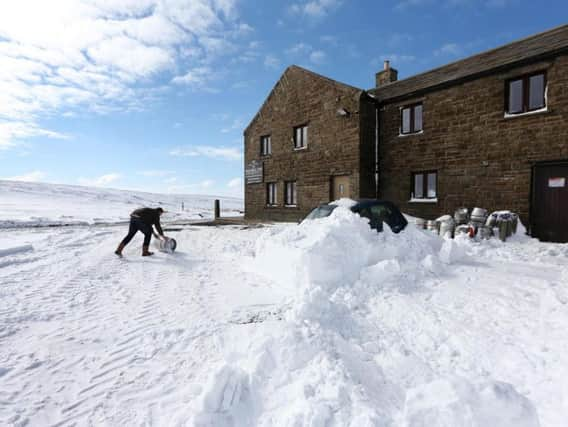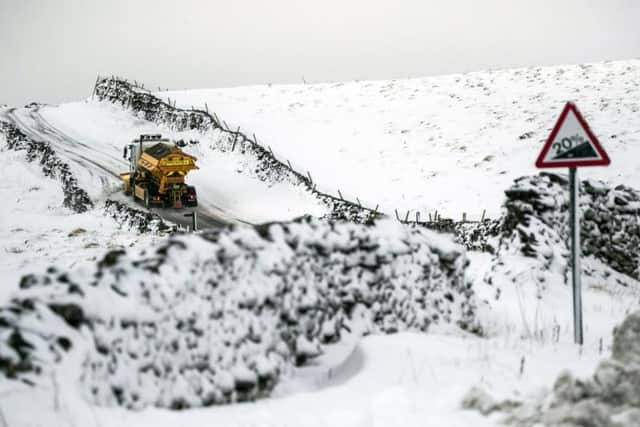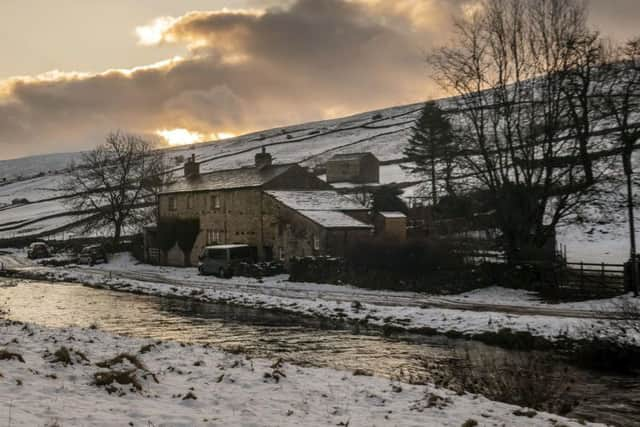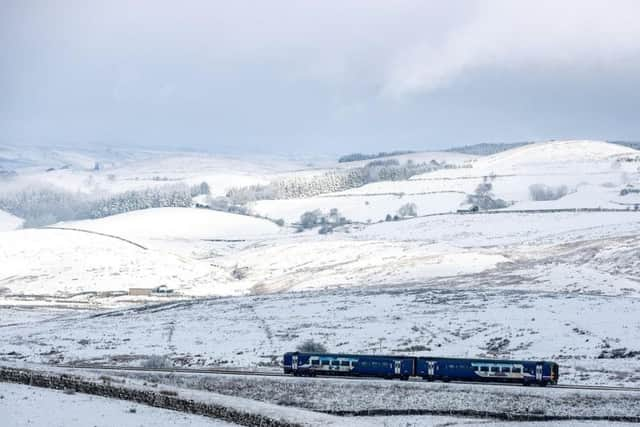This is how the most isolated communities in the Yorkshire Dales survive harsh winters


This is the reality for some of the most remote villages in Yorkshire as winter sets in.
Residents of the Dales and North York Moors have come to rely on community spirit, co-operation and the unexpected lifeline of Tesco deliveries to sustain them when heavy snowfall leaves them cut off.
Advertisement
Hide AdAdvertisement
Hide AdThis is what it's like to work as a ranger in the Yorkshire Dales National ParkSelf-sufficiency with a little help from Tesco


David lives in a village in Upper Wensleydale.
The nearest supermarket, in Catterick, is a three-hour round trip away, but a local farmer in his 70s who lost his livelihood to the food-and-mouth disease outbreak has now taken on the daunting task of driving Tesco delivery vans from the garrison town to the remote reaches of the Dales in all weathers.
"There is a developed sense of community and self-reliance and people just generally look out for each other. When newcomers arrive they will be welcomed and given the opportunity to engage with locals and community events, most of which might seem a little odd to people coming from an urban area," said David.
"While it's not fashionable, religion still plays a part, though it is mostly low-key and people use the church and chapels as much as a social centre and a place to meet. Quakerism and Methodism was always strong in this area, both religions that propagated a sense of self-help and comradeship and provided a sense of purpose.


Advertisement
Hide AdAdvertisement
Hide Ad"The strange thing is, we don't actually think of the area as being remote, as evidenced by the fact we get a weekly Tesco delivery! Tesco often get a bad name, but up here in the Upper Dales they are a real godsend. For us a visit to the nearest supermarket would involve nearly three hours of our time. For as little at £76 per year we can have a delivery on about 362 days of the year. Not only does this save us time and fuel it is also helpful to the environment as one van coming up the dales can save a dozen individual car journeys to the store.
How the popularity of the Three Peaks Challenge route has put a community under strain"There is also the social welfare element to a Tesco service. A number of elderly residents have orders placed for them by their family members who live far away, and for some the weekly Tesco delivery is a welcome opportunity for some social contact."
David's home has an oil Aga which is gravity-fed, so can burn even when the power supply fails. His family stockpile enough logs and coal to last through the winter, and also keep supplies of rice, flour and pasta.
"2013 was the last year we were actually cut off by snow for any period of time. Tesco have never failed to deliver. We have a good local market on Tuesday in Hawes, where we can get good quality fish and green groceries. There is a mobile fish and chip van that tours the area every week and we have a local butcher."


Advertisement
Hide AdAdvertisement
Hide AdThe farmer who took matters into his own hands when the snow ploughs failed to come
Rodney Beresford is the epitome of the self-reliant Dales farmer.
He lives in a farmhouse on Newby Head Pass, between Hawes and Ingleton, and began to plough the treacherous local roads - some of the highest in England - with his tractor when the local council stopped travelling to this forbidding part of Wensleydale. He is now paid by the council to clear and grit the routes for his neighbours.
Winters up here are so challenging that the RAF sometimes have to drop supplies to cut-off farmers by helicopter.
Advertisement
Hide AdAdvertisement
Hide AdRodney and his son Thomas battle against mountain passes that become 'mini Matterhorns' when snow falls, and their vehicles are also capable of hauling stranded cars that have left the road to safety.
“Fleet Moss is probably the very worst place to clear. Thomas even rescued a council gritting wagon there. Honestly, it’s diabolical.
This is what it's like to run a bed and breakfast in the Yorkshire Dales“How we began snow ploughing was through frustration. We got so fed-up with the road from Ingleton to Hawes getting blocked up and council leaving us abandoned, I asked them why.
“Turns out down in Skipton they didn’t know it was snowing up here. We were effectively left to our own devices. Though these days satellite weather maps give them a clue I asked them if we could do this area.
Advertisement
Hide AdAdvertisement
Hide Ad“They bit my hand off. Now we work for ‘North Yorkshire County Council, Skipton area’ - snow ploughing and gritting right on the county council’s extremity.”
Thomas also works as a coach driver for Bibby's of Ingleton, who are happy for him to take time off for his ploughing duties, as it prevents their buses from becoming trapped in difficult conditions.
“One of the worst winters up here was 1947. Old-timers remember it was a bad summer before that notoriously bad winter. The army had to use flame throwers in an attempt to blast through drifts on the Settle-Carlisle railway."
Lock-ins at the highest pub in England
Drinkers were famously stranded at the Tan Hill Inn near Keld, in Swaledale, on New Year's Day in 2010, after heavy overnight snowfall trapped revellers at England's highest pub inside. They were stuck along with the staff for three days until rescue came.
Advertisement
Hide AdAdvertisement
Hide AdThen-landlady Louise Peace, who has since sold the business, spoke about the 2009-10 winter as being one of the worst in memory.
"When it starts you can be knee-deep in two hours, but that year was particularly bad. I had gone out to help rescue stranded drivers and ended up being snowed out of the pub. There was no way I could get back and the next morning was no better. We had 60 guests up there and just two members of staff. I rang them up and said: ‘Right there is no way you can deal with them on your own’. I told them to get five of the guests together and set up a working party. That’s what they did and they had a whale of a time for three days.
“Another time I was snowed out there was only a chicken and a cat in the pub. I thought: ‘That’s a food chain right there’. When I finally got back in I was prepared for a bloodbath, but they were just cuddled up next to each other.”
In 2018, the pub was taken over by Bradford businessmen Mike Kenney and Andrew Hields, who want to turn Tan Hill into a destination pub for all seasons.
Advertisement
Hide AdAdvertisement
Hide AdThey've currently got a Santa's grotto and a reindeer herd, and will open their Icelandic-style spa with hot tubs and sauna in the new year. Stargazing pods are also in the pipeline.
Many of the staff live on-site, and are out gritting from 5am every morning. The pub has its own snow plough for clearing the car parks, and Andrew has recently been out rescuing stranded customers' cars with his Land Rover.
This is what it's like to run one of the most traditional pubs in the Yorkshire Dales"We're in complete isolation here, so we can't focus on passing trade - we need to give people a reason to travel here and they have high expectations," said Andrew.
"We're off-grid, we have our own power supply and we double up on everything - gas, coal, food and drink - to make sure we don't run out. Winter can be expensive! We manually grit the site ourselves, and the council gritters do come up here and do a decent job.
Advertisement
Hide AdAdvertisement
Hide Ad"We'll also put money behind the bar if anyone gets stranded - we don't really want them to leave! They'll be well-looked after. We have staff who work remotely part of the week and some also stay in the staff quarters.
"We have to warn people that the conditions could be bad - they come here at their own risk. Tan Hill has its own little climate, and we put live weather updates on the website."